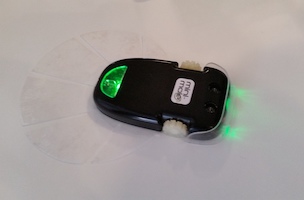Boston Firms Demo New Robots & Evolving Human-Machine Relationships

The breadth of New England’s robotics sector was on display Wednesday night at an event in Boston’s Seaport neighborhood, where startups showed off technologies for human transportation, schlepping products around warehouses and factories, underwater exploration, sweeping floors, and more.
The showcase was part of the monthly Mass Innovation Nights series, which aims to help local startups—primarily ones with small or nonexistent marketing budgets—gain more visibility. More than 300 people turned out to get a glimpse of the various gadgets, organizers said.
The featured products included Mini-Mole’s one-inch tall, autonomous sweeping robot (pictured above) that aims to pick up dust in hard-to-reach spots; Superpedestrian’s Internet-connected, electric-motor system that aids bicyclists; and Pong Robotics’ two-wheeled device intended to help senior citizens, the disabled, and military veterans and others with orthopedic pain to get around, while strengthening core muscles. [This paragraph updated with more details about Pong’s target customers.]
The event was a good way to sample offerings from the local early-stage robotics scene. Here are two themes that stood out to me:
—The local warehouse robotics field is crowded, but apparently friendly. NextShift Robotics is one of several firms that have emerged in the past several years with robots that help tote goods in warehouses and factories. Its local competitors include 6 River Systems, Vecna, Locus Robotics, and Stanley Robotics, which also demonstrated at Wednesday’s event. When I stopped by NextShift’s demo table, co-founder and CEO Mary Ellen Sparrow was chatting with someone from Locus. She said the local competitors are friendly and don’t mind talking with each other about what they’ve built (obviously without giving away any of the secret sauce).
I asked Sparrow for her take on the flurry of warehouse robotics firms that have popped up to fill a hole left after Amazon acquired Kiva Systems in 2012 for $775 million. She framed it as companies “trying to move beyond” what Kiva developed. “We’re trying to do the next evolution,” Sparrow said.
For its part, NextShift is focusing on relatively small, mobile robots that can be easily incorporated into a facility’s existing workflow, Sparrow said. Her company was formed last year after acquiring warehouse robotics technology developed by Harvest Automation, which chose to refocus on robots for agriculture. (Sparrow was the senior director of software development at Harvest, according to LinkedIn.)
Unlike some competing robots, NextShift’s machines aren’t meant to follow a human worker around. The human can stay at his or her station picking goods and placing them in a bin, which is then grabbed by the robot and delivered to the desired location in the warehouse. The person doesn’t have to lift the bin, so there’s less strain put on his or her back muscles, Sparrow said. The idea is to make picking more “enjoyable” while helping workers be more productive, she said.
Sparrow’s comments shed light on how NextShift is thinking about human-robot collaboration, a crucial theme in the industry, especially given all the hand-wringing over automation eliminating jobs.
—Robots are our friends, but they’re not alive. Collabots owner Russell Nickerson wants to shift the public discussion about robots away from fear of machines taking human jobs or staging a violent rebellion. It’s also important to remember that robots aren’t humans or pets, he said.
“They’re in this interesting limbo,” Nickerson said. “Robots are not people. Robots represent people.” What he means is robots reflect the humans that created them—designers, writers, engineers, and others.
Nickerson worked at SoftBank Robotics for over five years, but now he runs Collabots, a consulting firm that provides robotics training and helps schools integrate such technologies into their classrooms.
Nickerson said it’s important that society teaches children how to put robots in the proper context and helps them form healthy relationships with machines, especially as robots become more commonplace.
“We have to prepare future generations for this change,” he said.
(28)












